Seneca
said that the only
pleasure of the world,
is a quiet soul.
But by confession, he
never jumped
from an airplane,
shot cold water
into a hot vein, or
smashed through doors,
looking for lovers
and splintered dreams.
But Plato knew better:
mischiefs
proceed from
silhouettes--
pinions tattooed,
fear and sorrow
at full extension.
Viewing Blog: Shakes, Shivers, and Dithers, Most Recent at Top
Results 51 - 75 of 96

Poetry, opinions, and essays by Mark V. Williams.
Statistics for Shakes, Shivers, and Dithers
Number of Readers that added this blog to their MyJacketFlap:
Blog: Shakes, Shivers, and Dithers (Login to Add to MyJacketFlap)
JacketFlap tags: Add a tag
Blog: Shakes, Shivers, and Dithers (Login to Add to MyJacketFlap)
JacketFlap tags: Add a tag
The Google view was
illusory,
circumfluent voyeur,
able to make a close study
of the arena,
in all its phases,
go deep into the subconscious,
follow the chipmunk
into his hollow tie,
spying on me
as I pace the boundary;
this singular plot;
my length of planetarium,
witnessing
from such a ghostly ark—
my countenance,
my groves
and contour lines,
azimuth,
fixed upon this transplant
surrounded by the
contingency of
marigolds and songbirds.
Blog: Shakes, Shivers, and Dithers (Login to Add to MyJacketFlap)
JacketFlap tags: submitting poetry, Add a tag
As a writer of three published books, I have to ask: why submit poetry to lit journals? The Midwest Book Review, Small Press Bookwatch: June 2009, said of my book Circus by Moonlight, it is “a perfect browse for the poetry enthusiast,” and “...establishes Williams as an impressive talent and skilled wordsmith, deserving of as wide and appreciative an audience as possible." But the lit journals seem to have no interest in any of my poetry. When cashing the royalty checks for my two novels, I now have to consider why I would even want to showcase my writing in a forum that concentrates on work that would otherwise not be able to find an audience in mainstream, commercial publishing (we are talking over 600 print and online journals). The rejection letters are short and succinct—No Thanks. As writers know, lit journal editors need never explain their publishing decisions, so I can only speculate as to the degree of arbitrariness that subserves their deliberations. My understanding is that most books of poetry, that originate from the increasing pool of MFA writers and their professor’s, will sell around twenty copies. This is considered a good run. Well, my poetry book is already way past that number in sales. I guess I’ll stick with commercial fiction from now on, and post my poetry online for the world to see and judge for themselves (there are no gate keepers on the web).
Blog: Shakes, Shivers, and Dithers (Login to Add to MyJacketFlap)
JacketFlap tags: Add a tag
[I originally wrote this as a guest blog article for Jessica Bell's The Alliterative Allomorph.]
Mozart claimed that his letters came from God. Seamus Heaney said that his poetry came from a metaphorical dig, to uncover the hiding places of his power. For each, the result could be referred to as the source of creative inspiration.
So what is it and where does it come from? There are concepts of poetry that developed in separate ancient civilizations, which had no contact with each other. Yet their ideas and notions about poetry had similarities.
From the beginning in Western culture, there has been a dual attitude toward this source. The poem is made not only by the poet, but it is given to him by a deity or spirit. From this tradition, we still equate inspiration with divine gifts or with some sort of spiritual enlightenment. We think of the very best poets, as those who submit to influences stronger than they are, because what they perceive to see seems inconceivable to them (things that as humans we can only have an inaccurate and vague notion of).
In the New World, the Mayan culture believed that poetry enraptured man, and intensified his emotions and perceptive powers. It enabled him to perceive what he (as a human) ordinarily could not. Once enraptured, the poet would speak the only truth on earth.
I do not subscribe to the influence of an enlightened spirit or Muse, or God. I see poetry as a way to plumb the depths of my imagination, through what I have experienced (especially childhood), and what I have read (here I’m talking about development of the intellect). For me, a poem is something that says more in a few words than a novel can in five hundred pages, with wit and word-play. It has an extraordinary mixing of music and thought. The job of the poet is to choose the right words, not only for sound (the music of poignant language) and connotation (landscape), but even for the countenance of them.
The poem corresponds to a centrifuge of sound, alliteration and rhythm. The reader will be walking into a world for the very first time; a world of terseness and parsimony. True poetry is derived from the poet’s peculiar type of knowledge, which is the fruit of his authentic inner experience, the result of intuition (perhaps this is the part many mistake for spiritualism). So the poem becomes a profound expression, through symbol and metaphor, of what the poet has intuitively and mysteriously discovered.
Sylvia Plath wrote in her journal, when discussing the creation of some new poetry, “I feel my mind, my imagination, nudging, sprouting, prying & peering.”
I could not have said it better.
Another person said, “What makes a good poem? A good poet.”
Blog: Shakes, Shivers, and Dithers (Login to Add to MyJacketFlap)
JacketFlap tags: Add a tag
I have been a connoisseur of hats ever since I was a small boy. I even preferred them to toys (the exception being toy guns). But as an adult, I abhor real guns. Not so in the case of hats.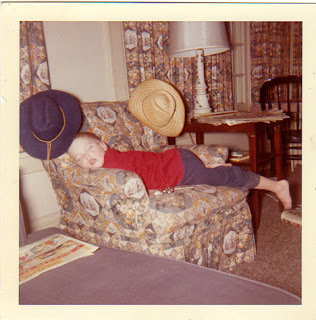
Me with some of my favorite hats.
Luckily for me, the Fedora is on the comeback, as well it should. Can you imagine Humphrey Bogart wearing a baseball cap?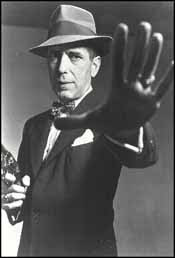
I use my Fedora (The Sydney, by AKUBRA) as part of the persona created for the image of Tonto Fielding, the pen name I use for my comedy writing. Tonto is the author of The Hillbilly Vampire Chronicles, and the comedy blog—Hillbilly Vampire.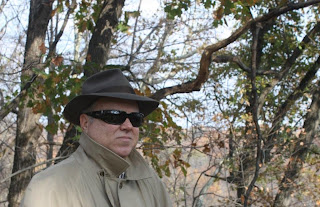
As Dr Who would say—Fedora’s are cool. Although there are those out there that would consider them to be a passing fad, I say that all those cool guys in the noir films are getting their just due, now that a few celebrities are letting us know by example, that you too can wear cool hats, and leave the ball caps in the closet.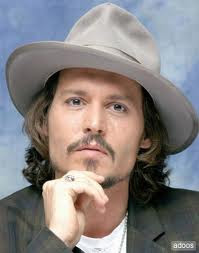
Johnny Depp
Justin Timberlake
Blog: Shakes, Shivers, and Dithers (Login to Add to MyJacketFlap)
JacketFlap tags: Add a tag
News of my thirty-fifth high school reunion came only weeks ago, which is not very much time to prepare. As it turned out, my wife had a commitment to a scrapbooking workshop on that day. I wasn’t sure what I should do. In the end I have pulled a Ralph Perk. He was the mayor of Cleveland, who turned down an invitation to the White House during the Nixon administration, because it fell on his bowling night.
The event is tonight and here I am in Athens (the school is in Gates Mills, Ohio). I would be lying if I said I wasn’t relieved.
Everyone knows how these milestones can create and foster exorbitant amounts of fear. We tend to revisit adolescent anxieties in our mind. Unfortunately for me, I am one of those peculiar people who can remember practically every day of their life. I can even recognize a person who I knew when I was six, after they have aged forty five years, instantly. I have vivid memories from when I was six months old, of my father and brother throwing snowballs at our window, as my mother holds me in her arms. My mother once took me to a friend’s apartment before my first birthday. I described the apartment to this friend almost thirty years later, and her jaw dropped to the floor. My description was accurate to the pattern of the oriental carpet.
So what does this have to do with high school? The problem for me is that the embarrassing and awkward moments have won the battle for prominence. The consequence is that high school has morphed into a nightmare. I have to force the good memories forward to balance the equation. Our school was small, but still large enough to have some cliques. I could be found straddled between the freaks and the geeks (if any of you remember the television show by that name). It took a long time to realize that life was so much more interesting as a geek. Hail the GEEKS! So now, to talk myself into actually attending my fortieth—I will have to remind myself, that by the time it arrives, most everybody will have been bitch-slapped enough by life, that any sense of entitlement will have been replaced by gratitude and humility, leveling the playing field.
Of course, at the same time, I know that I am not unique. There are others probably going through the same emotions.
Blog: Shakes, Shivers, and Dithers (Login to Add to MyJacketFlap)
JacketFlap tags: Original Poetry, Add a tag
The presentation was a
weighty exploration, which
no doubt consisted of a
beginning, middle, and
one very sad, sad end,
imputations compacted
temporally in the
thesis, an arc of
sensation, which led
from case to captive,
charged with desire,
prospect, and ruin,
revealing the most
sympathetic story ever told.
Blog: Shakes, Shivers, and Dithers (Login to Add to MyJacketFlap)
JacketFlap tags: 15 Books in 15 Minutes, Add a tag
This is my list of "books you can come up with in fifteen minutes" that had an impact on you. Several friends have passed along their list, so here is my contribution.
1. Gospel, by Wilton Barnhardt
2. Lonesome Dove, by Larry McMurtry
3. Son of the Morning Star, by Evan S. Connel
4. The Marx Family Saga, by Juan Goytisolo
5. The Adventures of Huckleberry Finn, by Mark Twain
6. The Savage Detectives, by Robeto Bolaño
7. The Name of the Rose, by Umberto Eco
8. The Big Rock Candy Mountain, by Wallace Stegner
9. Death and the Penguin, by Andrey Kurkov
10. The Twelve Chairs, by Ilf & Petrov
11. Tourist Season, by Carl Hiaason
12. Planet of the Apes, by Pierre Boulle
13. The Hobbit, by J.R.R. Tolkein
14. The Electric Kool-Aid Acid Test, by Tom Wolfe
15. A Confederate General From Big Sur, by Richard Brautigan
Blog: Shakes, Shivers, and Dithers (Login to Add to MyJacketFlap)
JacketFlap tags: Add a tag
I am the Itinerate Poet.
Or at least, that’s what Seamus Heaney called me when we met.
I crashed the reception after the reading, entering through the kitchen. Why not? I said to myself. After all it was a three hour drive to get there.
He was right, you know.
I have always written poetry. And I have always worked jobs that kept me on the move and just below the poverty line. A dependent, you could say—friends and family always helping out with the bills and what not.
But always there was the poetry.
I don’t have any academic connections. Nobody asks me to read for them. I am anonymous.
He held a glass of whisky, and all I could think of was how I can’t drink anymore. Not—recognize me—I exist. No, there was only the whiskey and the poetry.
I am the Itinerate Poet.
Blog: Shakes, Shivers, and Dithers (Login to Add to MyJacketFlap)
JacketFlap tags: Original Poetry, Mark Van Aken Williams, Add a tag
Fire trucks and cherry pickers are on the scene
Obstructing any inquisition
Sparks and flotsam conspiratorial
The bolt shot through me--halfway
Into my dialogue
Into the baser part of the brain
Left in darkness, left in a strobe
Not in rhythm with my pulse
Only irregular
Blog: Shakes, Shivers, and Dithers (Login to Add to MyJacketFlap)
JacketFlap tags: Original Poetry, Mark Van Aken Williams, Add a tag
nothing is so pernicious
as the charismatic contagion
an embalming fluid, this blackdamp
of cold light and scattered countenance
the unconscious reflex
of our shameful spewing
be there any frigid agony
in it, or torpid bashfulness
while the hypothermia in the entrails
will make the melancholy atomic
frostbitten wildwood
of trust and confidence
deadweight of thorns making an
all-out effort to bloodstain the margins
a signet from long past
yet so painfully contemporary
Blog: Shakes, Shivers, and Dithers (Login to Add to MyJacketFlap)
JacketFlap tags: Original Poetry, Mark Van Aken Williams, Add a tag
branding irons are to be used
in the suture of our commutable contusions
only yesterday I exhaled your dingy smoke
and it irradiated like frankincense
we made a toast with Helena’s bowl
to the true nepenthes in Homer
and retired our sorrow and debt
to the aliment of all heart-eating vice
but ended up mutually misaffecting each other
with songs and slurs until you broke my skull open
which it turned out, no reparation would suffice
unless the injury remained rational
Solomon himself would have offered me his cup
because, the onlookers thought i was a ghost
although you and i knew different--that atheism
like ours could be maintained by heathens alone
Blog: Shakes, Shivers, and Dithers (Login to Add to MyJacketFlap)
JacketFlap tags: Voltaire's Calligrapher by Pablo De Santis, Book Review, Add a tag
 Voltaire's Calligrapher by Pablo de Santis
Voltaire's Calligrapher by Pablo de Santis
My rating: 4 of 5 stars
“Voltaire’s Calligrapher,” is an owlish historical novel, as well as part thriller. It is also a philosophical novel, full of adventure. Dalessius is a twenty year old calligrapher and archivist, who goes to work for the famous Voltaire. Mechanical writing is already on the scene, but the talent of the calligrapher is still needed in a world where invisible and poisonous varieties of ink still have place among enjoyable cat and mouse games, filled with conspiracies, individual manuscripts, libraries, and booksellers. He is raised by an uncle, who makes his living transporting corpses. But once in the services of Voltaire, Dalessius is set out as a spy to look into the case of the suspiciously condemned Jean Calas, but ends up in a web of far greater intrigue between the Dominicans and the Jesuits. At a deeper level, you could say, he finds himself in the middle of the intrinsic struggle between the mephitic remnants of the Dark Ages and its collateral ingredients. The stage is filled with life-like automatons, graveyards, executioners with their ingenious devices, huge homes where it easy to get lost, back alleys, bordellos, henchmen, and poisonous fish. How can you go wrong? The best part—it’s not too long. It is short, amusing, and very, very smart.
View all my reviews
Blog: Shakes, Shivers, and Dithers (Login to Add to MyJacketFlap)
JacketFlap tags: Add a tag

The Prophet of Sorrow by Mark Van Aken Williams
Lucky Press, LLC, has been named a finalist in the The National "Best Books 2010" Book Awards.”--Fiction & Literature, Historical Fiction.
Blog: Shakes, Shivers, and Dithers (Login to Add to MyJacketFlap)
JacketFlap tags: Book Review:Speak, Nabokov by Michael Marr, Add a tag
 Speak, Nabokov by Michael Maar
Speak, Nabokov by Michael Maar
My rating: 3 of 5 stars
In Speak, Nabokov, Michael Maar gives us literary criticism that digs into the fiction of Vladimir Nabokov like a cabalist seeking out the hidden truths. Because we are led to believe that Nabokov is so intelligent, absolutely everything in his fiction is detail and put there on purpose. Nothing is left to chance. And Maar, combining biography with the fiction, also combines different people in Nabokov’s life with the persons that inhabit the fiction. But what of the author is in here? To me, much of it is speculation, much like a detective’s case--a hint here, a clue there. With footnotes galore, we are painted a picture of the philosophical nature of Nabokov’s work being Gnosticism, by aegis of Schopenhauer. I am not a scholar; so much of the jargon was lost foreign to me, both in the text and footnotes. I also have no pretentions of being a metaphorical Holmes. In fact, I tend to get uncomfortable when these guys steer towards literary “outing.” Surly Nabokov must have been homosexual, because of clues left in his fiction. But if this is the way you prefer your analysis, here is a wonderfully slim volume for you. As Maar puts it, “Nabokov is fully present everywhere in his work; even the tiniest sliver contains the whole. And that is why each of these slivers scintillates with a dazzling spectrum of colors—a magic that is hard to convey in analysis.”
View all my reviews
Blog: Shakes, Shivers, and Dithers (Login to Add to MyJacketFlap)
JacketFlap tags: Add a tag
This novel is set in Nazi-occupied Europe, although it is never mentioned. There is no guessing here. The adversary is the Führer (referred to as “my enemy”) and the word Nazi is never used. All of this creates an atmosphere where the protagonist fails to come to grips with the reality of the ascendance of National Socialism and the relationship between subject matter and context. Written as memoir, we see how a person who is just as caught up in the culture of his homeland as those who seek to make him an enemy, can only see himself with detachment as a way to protectively shield himself from certain truths, not only about himself but about the horror in the making. This dichotomy is never clearer than when the protagonist (unknown to be a Jew) is sitting with the friends (Nazi thugs) of a girl he has a crush on and them talking about an assignment to desecrate a Jewish cemetery. This is as haunting a scene as you will ever come across in fiction. The prose is astonishing: part philosophy, part psychology, and part poetry—combined to point out the failure of coming to grips with reality. Because of the anonymous nature of the people and places, I was able to transpose this story to a new time, here in America, where the hatred toward Muslims could have the same effect on a young Muslim man who also grew up an American. Certainly a masterpiece!
Blog: Shakes, Shivers, and Dithers (Login to Add to MyJacketFlap)
JacketFlap tags: Humor, Sergei Dovlatov, Ours: A Russian Family Album, Add a tag
Mark Twain once said, “The quality of humor is the commonest thing in the world. I mean the perceptive quality of humor. In this sense every man in the world is a humorist. The creative quality of humor - the ability to throw a humorous cast over a set of circumstances that before had seemed colorless is, of course, a different thing.” The Russian émigré, Sergei Dovlatov, traces four generations of his family’s life with the circumspect of the truly creative humorist. Through the likes of Uncle Aron, Cousin Boris, Grandpa Isaak, and a terrier named Glasha, we discover the amusing, comical, incongruous, and absurdity that goes hand in glove with the very course of Soviet history. The chaos of the past is remembered and intermingled with a sense of recovery. Even though each life is unique, all lives are familiar to us. So with Cousin Boris, the boy who started with such promise, and was always held up as an example to Sergei (yet somehow kept ending up in prison), we get this—“ I finally understood the ruling trait in my cousin’s character: he was a natural-born existentialist. He could act only in extreme situations: build a career only in prison, fight for life only on the edge of the abyss.” And with Glasha, the terrier—“She was surrounded by esoteric poets, Suprematist painters, composers of atonal music, and sculptors of non-representational constructions. All of them were indefatigable critics of the regime, especially when in their cups. With friends like that, she could hardly have turned out politically loyal. Actually, she herself behaved no better. To be specific, she barked at policemen and generally hated all uniforms, whether on soldiers, sailors, or ticket collectors. Along with this, her displeasure was aroused by red banners and billboards bearing revolutionary slogans, and to top it off, she liked to relieve herself behind a certain building, at the base of a four-meter-tall portrait of Brezhnev.”
Blog: Shakes, Shivers, and Dithers (Login to Add to MyJacketFlap)
JacketFlap tags: Add a tag
When considering the appalling state of education in America, we need to approach the problem and the challenge in an imaginative and innovative way. The old strategy no longer works. So please stop thinking about better unions and throwing huge sums of money at antiquated systems. As odd as this concept may seem to many people, entrenched in their particular paradigms, breakthrough ideas are the answer. Then, and more importantly, we need to take action on these ideas.
First we need to identify what our challenges are (poverty, teacher training, etc.), and then to recognize our goals. This can start with our dissatisfaction—then move to our desires.
I know most of you hate this part, simply because we are used to thinking that “studying something” usually means just putting something off. But it is crucial to access and review all the data we have. You can not innovate without having an objective beginning point.
Once we begin to understand what the problems are, we can then understand the challenges inherent in them. This will help us to focus on what the REAL problems are. We want to come up with the right answers to the right problems.
We must be vigilant about deferring judgment about new ideas. This is where being stuck in old paradigms keeps us from proper exploration. To often these ideas are labeled as wild, outrageous, and out-of-the-box. Making creative connections, taking risks, and trying new associations will lead to potentially innovative scenarios.
Finally, we must generate a barometer needed to analyze and critique these ideas for change, in order to find out which of these are the best ideas.
This country was based and developed on the premise and fruition of great ideas and the action taken to realize them.
Lets do what we’re good at.
Blog: Shakes, Shivers, and Dithers (Login to Add to MyJacketFlap)
JacketFlap tags: Add a tag
 Mona and Other Tales by Reinaldo Arenas
Mona and Other Tales by Reinaldo Arenas
My rating: 2 of 5 stars
This is a work of stories and other pieces of short fiction, much of which appeared to be experimental, or so it seemed to me because it resembled a bad nightmare. I’m not fond of reading ten or twenty pages and when I’m done I just shake my head and say, “What the F***?” In all fairness though, I did find one story, “Mona,” to be very engaging and thoroughly kept my disposition to incredulity aux abois. I know that Arenas is supposed to be one of the Latin American greats (and they made a movie about his life), but I guess I’ll leave the experts to their precincts, and go search out my copy Ring Lardner short stories.
View all my reviews
Blog: Shakes, Shivers, and Dithers (Login to Add to MyJacketFlap)
JacketFlap tags: Add a tag
 The Engagement by Georges Simenon
The Engagement by Georges Simenon
My rating: 4 of 5 stars
This is one Simenon’s more compelling psychological novels (1933). In it we follow Mr. Hire, a solitary man with a dubious past, who is framed for a murder he did not commit. Mr. Hire’s bleak existence is seen only through the author’s juxtaposition of character, which slowly emerges, against the settings in which he navigates his daily routine (his commute, his business, and his various other habits). He is illusive and remains isolated as this trap conspires around him, and a constantly heightened tension creates an oppressive environment. Part psychology, part thriller, and definitely part eerie. This one is a must read for Simenon neophytes or any one into books with plenty of atmosphere, character, intensity, humor, and an understanding of the afflictive mob.
View all my reviews
Blog: Shakes, Shivers, and Dithers (Login to Add to MyJacketFlap)
JacketFlap tags: Original Poetry, Add a tag
from Circus by Moonlight
so jesus said to be like doves
and you squated to drop an egg
legs unstable, not sure from which
orifice it would leap out
developing perseverance, i saw
this on your two minds attempting
to evoke the inexpreessible
symbols (harps, crowns, and gold)
Blog: Shakes, Shivers, and Dithers (Login to Add to MyJacketFlap)
JacketFlap tags: Add a tag
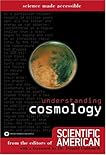 Understanding Cosmology by Scientific American
Understanding Cosmology by Scientific American
My rating: 3 of 5 stars
I got bumped from the Russian Soyuz. They overbooked, I guess. Anyway, $40 million was a little steep, I think. So before I make that mistake again, and book a flight with Boeing-Space Adventures, I thought I’d check out what all the hubbub was about. Actually, I was interested in the idea of whether today’s Cosmologists were nothing more than modern day alchemists. Also, it would be interesting to see if there was any theology threads weaved through this tapestry of science. “Understanding Cosmology,” in the most pedestrian language scientists are capable of (many times completely incomprehensible) attempts to bring the reader closer to the truth of how the universe formed, evolved and developed, and what it means to us. During the parts that I could understand, I found out that the Big Bang Theory is old news. There is so much more that they know now, like what happened before the Big Bang. WHAT? Yeah--before. What you come away with is that there are whole new worlds of thought, which are now unimagined, and will eventually become commonplace theories in the future. Oh, and by the way, it turns out that the Cosmologists are in fact closet alchemists—the big question for them being: is if there could be a theory of everything so simple and so elegant that its basic concepts could be understood by a child.
View all my reviews
Blog: Shakes, Shivers, and Dithers (Login to Add to MyJacketFlap)
JacketFlap tags: Add a tag
This is the first novel by Swiss play write Robert Pagani, and is as shallow as two of its two title characters who I will nickname, the “painfully full bladder” and the “erection.” The book takes place on May 31, 1906, the wedding day of King Alfonso XIII of Spain to British Princess Maria Eugenia of Battenberg. It was short-listed for the Prix du Premier Roman in France. Why? You got me. But this is coming from a race of people who think Jerry Lewis is a genius. During a time when people were beginning to question the idea that royal blood transcends mortality, instead of an insightful exploration of corporeal beings being subject to injury and death, we get something that never comes close to shaking the body politic. The Princess is concerned with how badly she needs to urinate, in the middle of all the carnage (a bomb is thrown at the wedding procession). “Pipi, always pipi,” and “Pipi--It was beginning to be painful.” The King on the other hand, suffers from Priapism, and simply can’t wait to pop the royal cherry. The end is too ludicrous to even bother covering, but I’ll give you a hint. There was no stain on the sheet.
Blog: Shakes, Shivers, and Dithers (Login to Add to MyJacketFlap)
JacketFlap tags: Add a tag
How can the story of one unknown preacher in Florida, with a congregation of around fifty, get world wide news coverage about what was supposed to be a gimmick to attract more congregants?
In the age of the twenty four hour news cycle and the insatiable appetite for more and more opinion dominated coverage masked as fact, stories with significant political symbols can go viral.
A symbol is something used by human beings to index meanings that are not inherent, nor discernable from, the object itself. It can be defined as a thing the value or meaning of which is in no instance derived from or determined by properties intrinsic in its physical form. John Locke termed it as having “their signification,” from “the arbitrary imposition of men.”
In this case, the Koran is the political symbol for different individuals’ meaning to the same object. And because socially significant symbols arise and are sustained through a system of social interaction, they become regarded as elements of a culture.
When this happens, within the current media environment, individuals ignore personally irrelevant messages and pay attention to the kinds of things they need and agree with. The reasons may be behavioral, emotional, or intellectual. They tend to use the media to gain a sense of security and social adequacy. They feel gratification when the media reinforce what they believe they already know. When people only focus on what is personally useful and gratifying to them, they will then naturally ignore other pieces of information, regardless of its political and social significance (especially if the information disturbs their peace of mind, and conflicts with their political and social tastes, feelings and attitudes).
The next factor that comes into play is that the media as gatekeepers to information, tell people in fairly uniform fashion which individual issues and activities are most significant and deserved to ranked high on everybody’s agenda. Most of us easily accept and adopt the media’s agenda of importance. When the media make events seem important, politicians quickly run to the nearest camera to comment about them and to take action.
When these symbols become political, they quickly become characterized by a variety of myths, assumptions, and prescriptions regarding nature, man, and society. However, symbols should stand apart from the meanings they index at the cultural level, just as they should at the individual level. When the media gets involved, along with the subsequent politicizing, the cultural meaning of these symbols comes from the interpretations popularly accorded it. In our case, the Koran, becomes divorced from the cultural meaning with which it was once associated. It now has taken on a life of its own.
Television and the internet have created a new, impressionable public, who are highly susceptible to these symbolic cues. Today the sheer volume of new information has created a more involved public. The symbols that come into the twenty four hour news cycle serve to distinguish groups as well as unify them. It is therefore easy to see how they can also play a role in the dynamics of creating social conflict.
And this is why they are potent and this is why they can go viral.
Blog: Shakes, Shivers, and Dithers (Login to Add to MyJacketFlap)
JacketFlap tags: Add a tag
 Tinkers by Paul Harding
Tinkers by Paul Harding
My rating: 3 of 5 stars
Warning!!! This book has no vampires, wizards in training, or is on any best sellers list. This means, you’ve probably never heard of it. But it is a good book from a small press (Belleview Literary Press). This is like many other books from small presses, where good writers are desperately trying to connect their work with readers. This one happened to get word-of-mouth momentum and found its audience. Then something strange happened—it won the Pulitzer Prize. I found it to be an enjoyable read, and I confess I was rooting for the home team (my books are published by a small press). I especially enjoyed the descriptive fiction about growing up and living in rural Maine. I did though have problems with the parts that sounded like a graduate writing school assignment (impossible to understand). These passages are in a language only spoken in English Departments. Many writers unfortunately suffer from what I call the Gabriel Garcia Marquez wannabe syndrome (if its mystical sounding enough, it has to be good) It just makes me feel dumb. I never went to that school.
View all my reviews
View Next 20 Posts


LOL. Gotcha :o)